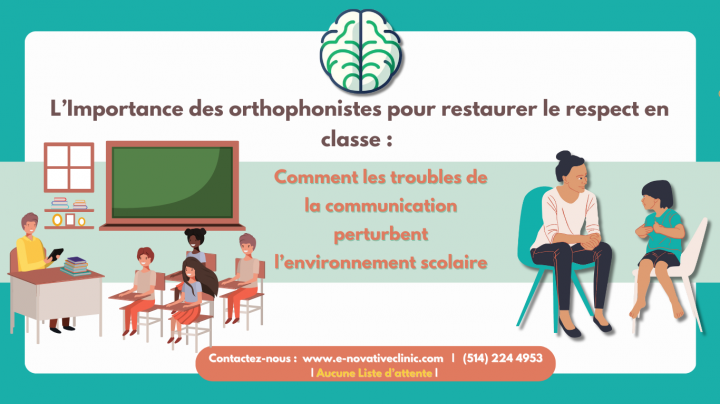Speech therapists : How to restore respect in the classroom and treat communication disorders
Speech Therapists Admin / June 27, 2025

Disruptive behavior in the classroom is often perceived as a sign of indiscipline or lack of respect. However, it's crucial to understand that these behaviors can be symptoms of communication disorders. When a student has difficulty understanding or expressing himself, this can provoke frustration, leading to inappropriate behavior.
I- Link between communication disorders and behavior
Communication disorders directly disrupt teaching and influence respect in the classroom. This is why speech therapists intervene to improve this aspect. Whether receptive (difficulty understanding language) or expressive (difficulty expressing thoughts), these disorders are often under-diagnosed.
These difficulties can disrupt learning and create a gap between the student and others. A student who doesn't fully understand instructions may feel excluded, which can lead to anxiety, withdrawal or aggression. One study shows that untreated disorders can affect children's social and emotional development.
II- Speech therapy strategies to support teachers
Speech therapists use a variety of techniques to help students overcome their communication disorders, thus fostering a respectful classroom environment.
1. Using visual aids
Speech therapists can recommend visual aids such as pictograms or picture cards to accompany verbal instructions. For example, pictograms representing the steps in a task can help a student follow instructions more easily, and reduce anxiety linked to misunderstanding.
2. Language simplification and modulation
Speech therapists can train teachers to simplify their language, using short sentences and repeating instructions in a modulated way to ensure all students understand. For example, use a simple sentence structure such as "Take your notebook. Open it to page 12“ rather than ”Get ready for page 12" will help avoid misunderstandings.
3. Creating a Personalized Intervention Plan (PIP)
For students identified as having communication disorders, a speech therapist can work with the teacher to develop a PIP. This plan includes specific strategies adapted to the student's needs, such as structured breaks to check comprehension or the integration of role-playing to practice social interactions.
III- Working with teachers and parents
In addition to their role with students, speech therapists play a key role in working with teachers to adjust teaching methods. For example, they can recommend specific strategies to help teachers better understand and meet the needs of students with communication disorders. This may include training or workshops to sensitize teachers to the importance of adapting their speech and instructions. Parents, for their part, are often guided by speech therapists to apply techniques at home that foster the development of communication skills, helping to maintain a respectful classroom environment.
Speech therapists work closely with teachers to adjust teaching methods. For example, they can organize workshops to sensitize teachers to the different types of communication disorders, and train them in the use of specific tools such as augmentative and alternative communication (AAC) applications. Parents, for their part, can be guided on how to reinforce communication skills at home, using repetition and positive reinforcement techniques.
If you're a parent or teacher, and you've noticed communication difficulties in a child, it's important to consult a speech therapist for a full assessment. With early intervention and appropriate support, you can significantly improve classroom behavior and re-establish a climate of respect.